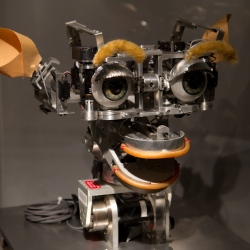
Why does Google need robots? Because it already rules your pocket. The mobile market, except for the slow rise of wearables, is saturated.There are millions of handsets around the world, each one connected to the Internet and most are running either Android or iOS.
Except for incremental updates to the form, there will be few innovations coming out of the mobile space in the next decade.
Then there’s Glass. These devices bring the web to the real world by making us the carriers. Google is already in front of us on our small screens but Glass makes us a captive audience. By depending on Google’s data for our daily interactions, mapping, and restaurant recommendations – not to mention the digitization of our every move – we become some of the best Google consumers in history. But that’s still not enough.
Google is limited by, for lack of a better word, meat. We are poor explorers and poor data gatherers. We tend to follow the same paths every day and, like ants, we rarely stray far from the nest. Google is a data company and needs far more data than humans alone can gather. Robots, then will be the driver for a number of impressive feats in the next few decades including space exploration, improved mapping techniques, and massive changes in the manufacturing workspace.
Robots like Baxter will replace millions of expensive humans – a move that I suspect will instigate a problematic rise of unemployment in the manufacturing sector – and companies like manufacturing giant Foxconn are investing in robotics at a clip. Drones, whether human-control or autonomous, are a true extension of our senses, placing us and keeping us apprised of situations far from home base. Home helpers will soon lift us out of bed when we’re sick, help us clean, and assist us near the end of our lives. Smaller hardware projects will help us lose weight and patrol our streets. The tech company not invested in robotics today will find itself far behind the curve in the coming decade.
